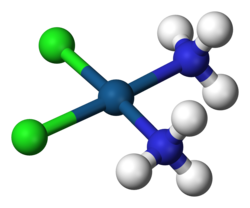Cisplatin
pharmaceutical drug From Wikipedia, the free encyclopedia
Remove ads
Cisplatin is a medicine used to help treat cancer. It contains a metal called platinum. It is part of a group of treatments called chemotherapy. Although scientists first made it in 1845, they did not realize it could help fight cancer until the 1960s.[2] Once doctors started using it, cisplatin became an important tool in cancer treatment. It works especially well for cancers like testicular, ovarian, bladder, lung, cervical, and head and neck cancer. In fact, it helped raise the cure rate for testicular cancer to over 90%, which was a huge improvement because that cancer was very hard to treat before. Doctors usually give cisplatin through a vein using an IV. It is often combined with other cancer drugs to make it work better and to stop cancer cells from becoming resistant.[3][4]
Cisplatin is a special kind of chemical made with the metal platinum. Cisplatin is a coordination complex of platinum(II) with the formula [PtCl₂(NH₃)₂]. In the center is a platinum atom, and around it are two chlorine atoms and two ammonia molecules, all in a specific shape called a "cis" pattern. That’s where the name cisplatin comes from. This exact shape is very important for how cisplatin works in the body. When cisplatin enters a cancer cell, it changes slightly by swapping one or both of its chlorine atoms for water. This new form can then stick to the cell’s DNA. By doing this, it blocks the DNA from copying itself or being used properly. This damage makes the cancer cell stop working and eventually die. Because cancer cells grow and divide quickly, cisplatin is especially good at killing them.[3][4][5]
Even though cisplatin is a powerful cancer medicine, it can cause some serious side effects. These include damage to the kidneys, nerves, and hearing. It can also cause strong nausea and vomiting. Because of these problems, doctors have to be very careful with how much of the drug they give and how often. Patients may also get extra treatments like special medicines or a lot of fluids to help protect their bodies from these side effects. Another problem is that some cancers do not respond to cisplatin, or they stop responding over time. This is called resistance. To deal with this, scientists have worked hard to create other drugs similar to cisplatin, like carboplatin and oxaliplatin. These newer medicines can sometimes work better or have fewer side effects.[3][4]
Remove ads
References
Wikiwand - on
Seamless Wikipedia browsing. On steroids.
Remove ads



